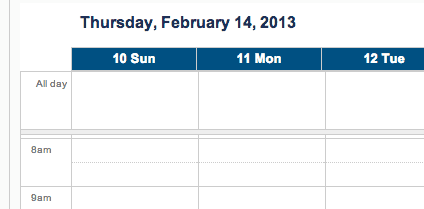Febrero 14, 2013
estebanvalerioh
El módulo Calendar en su versión para drupal 7, no cuenta con la fechas al lado del nombre para la vista de Semana.
A continuación implementare una solución basada en los comentarios del issue reportado http://drupal.org/node/1248002 del módulo Calendar para obtener un resultado similar al presentado en la siguiente imagen.
Nota: Tener en cuenta que el código está hecho, partiendo que el primer día de la semana es el domingo.
- Crear la siguiente función
Agregar la siguiente función en el archivo template.php del tema activo.
function get_start_end_dates_for_week($week, $year) {
$return = array();
$date_string = $year . 'W' . sprintf('%02d', $week);
for ($i = 0; $i < 7; $i++) {
$return[$i] = date('j', strtotime($date_string . $i));
}
return $return;
}- Copiar el archivo de template
Copiar el archivo calendar-week-overlap.tpl el cual se encuentra en la caperta theme del módulo Calendar a la carperta del tema activo.
<pre title="calendar-week-overlap.tpl.php"><?php
/**
* @file
* Template to display a view as a calendar week with overlapping items
*
* @see template_preprocess_calendar_week.
*
* $day_names: An array of the day of week names for the table header.
* $rows: The rendered data for this week.
*
* For each day of the week, you have:
* $rows['date'] - the date for this day, formatted as YYYY-MM-DD.
* $rows['datebox'] - the formatted datebox for this day.
* $rows['empty'] - empty text for this day, if no items were found.
* $rows['all_day'] - an array of formatted all day items.
* $rows['items'] - an array of timed items for the day.
* $rows['items'][$time_period]['hour'] - the formatted hour for a time period.
* $rows['items'][$time_period]['ampm'] - the formatted ampm value, if any for a time period.
* $rows['items'][$time_period]['values'] - An array of formatted items for a time period.
*
* $view: The view.
* $min_date_formatted: The minimum date for this calendar in the format YYYY-MM-DD HH:MM:SS.
* $max_date_formatted: The maximum date for this calendar in the format YYYY-MM-DD HH:MM:SS.
*
*/
$header_ids = array();
foreach ($day_names as $key => $value) {
$header_ids[$key] = $value['header_id'];
}
//dsm('Display: '. $display_type .': '. $min_date_formatted .' to '. $max_date_formatted);
?>
<div class="calendar-calendar"><div class="week-view">
<div id="header-container">
<table class="full">
<tbody>
<tr class="holder"><td class="calendar-time-holder"></td><td class="calendar-day-holder"></td><td class="calendar-day-holder"></td><td class="calendar-day-holder"></td><td class="calendar-day-holder"></td><td class="calendar-day-holder"></td><td class="calendar-day-holder"></td><td class="calendar-day-holder"></td><td class="calendar-day-holder margin-right"></td></tr>
<tr>
<th class="calendar-agenda-hour"> </th>
<?php foreach ($day_names as $cell): ?>
<th class="<?php print $cell['class']; ?>" id="<?php print $cell['header_id']; ?>">
<?php print $cell['data']; ?>
</th>
<?php endforeach; ?>
<th class="calendar-day-holder margin-right"></th>
</tr>
</tbody>
</table>
</div>
<div id="multi-day-container">
<table class="full">
<tbody>
<tr class="holder"><td class="calendar-time-holder"></td><td class="calendar-day-holder"></td><td class="calendar-day-holder"></td><td class="calendar-day-holder"></td><td class="calendar-day-holder"></td><td class="calendar-day-holder"></td><td class="calendar-day-holder"></td><td class="calendar-day-holder"></td></tr>
<?php for ($i = 0; $i < $multiday_rows; $i++): ?>
<?php
$colpos = 0;
$rowclass = "all-day";
if ($i == 0) {
$rowclass .= " first";
}
if ($i == $multiday_rows - 1) {
$rowclass .= " last";
}
?>
<tr class="<?php print $rowclass?>">
<?php if($i == 0 && ($by_hour_count > 0 || !empty($start_times))) :?>
<td class="<?php print $agenda_hour_class ?>" rowspan="<?php print $multiday_rows?>">
<span class="calendar-hour"><?php print t('All day', array(), array('context' => 'datetime'))?></span>
</td>
<?php endif; ?>
<?php for($j = 0; $j < 7; $j++): ?>
<?php $cell = (empty($all_day[$j][$i])) ? NULL : $all_day[$j][$i]; ?>
<?php if($cell != NULL && $cell['filled'] && $cell['wday'] == $j): ?>
<?php for($colpos; $colpos < $cell['wday']; $colpos++) : ?>
<?php
$colclass = "calendar-agenda-items multi-day";
if ($colpos == 0) {
$colclass .= " first";
}
if ($colpos == 6) {
$colclass .= " last";
}
?>
<td class="<?php print $colclass?>"><div class="inner"> </div></td>
<?php endfor;?>
<?php
$colclass = "calendar-agenda-items multi-day";
if ($colpos == 0) {
$colclass .= " first";
}
if ($colpos == 6) {
$colclass .= " last";
}
?>
<td colspan="<?php print $cell['colspan']?>" class="<?php print $colclass?>">
<div class="inner">
<?php print $cell['entry']?>
</div>
</td>
<?php $colpos += $cell['colspan']; ?>
<?php endif; ?>
<?php endfor; ?>
<?php while($colpos < 7) : ?>
<?php
$colclass = "calendar-agenda-items multi-day no-entry";
if ($colpos == 0) {
$colclass .= " first";
}
if ($colpos == 6) {
$colclass .= " last";
}
?>
<td class="<?php print $colclass?>"><div class="inner"> </div></td>
<?php $colpos++; ?>
<?php endwhile;?>
</tr>
<?php endfor; ?>
<?php if ($multiday_rows == 0) :?>
<tr>
<td class="<?php print $agenda_hour_class ?>">
<span class="calendar-hour"><?php print t('All day', array(), array('context' => 'datetime'))?></span>
</td>
<?php for($j = 0; $j < 7; $j++): ?>
<?php
$colclass = "calendar-agenda-items multi-day no-entry";
if ($j == 0) {
$colclass .= " first";
}
if ($j == 6) {
$colclass .= " last";
}
?>
<td class="<?php print $colclass?>"><div class="inner"> </div></td>
<?php endfor; ?>
</tr>
<?php endif; ?>
<tr class="expand">
<td class="<?php print $agenda_hour_class ?>">
<span class="calendar-hour"> </span>
</td>
<?php for($j = 0; $j < 7; $j++): ?>
<?php
$colclass = "calendar-agenda-items multi-day no-entry";
if ($j == 0) {
$colclass .= " first";
}
if ($j == 6) {
$colclass .= " last";
}
?>
<td class="<?php print $colclass?>"><div class="inner"> </div></td>
<?php endfor; ?>
</tr>
</thead>
</table>
</div>
<div class="header-body-divider"> </div>
<div id="single-day-container">
<?php if (!empty($scroll_content)) : ?>
<script>
try {
// Hide container while it renders... Degrade w/o javascript support
jQuery('#single-day-container').css('visibility','hidden');
}catch(e){
// swallow
}
</script>
<?php endif; ?>
<table class="full">
<tbody>
<tr class="holder"><td class="calendar-time-holder"></td><td class="calendar-day-holder"></td><td class="calendar-day-holder"></td><td class="calendar-day-holder"></td><td class="calendar-day-holder"></td><td class="calendar-day-holder"></td><td class="calendar-day-holder"></td><td class="calendar-day-holder"></td></tr>
<tr>
<?php for ($index = 0; $index < 8; $index++): ?>
<?php if ($index == 0 ): ?>
<td class="first" headers="<?php print $header_ids[$index]; ?>">
<?php elseif ($index == 7 ) : ?>
<td class="last"">
<?php else : ?>
<td headers="<?php print $header_ids[$index]; ?>">
<?php endif; ?>
<?php foreach ($start_times as $time_cnt => $start_time): ?>
<?php
if ($time_cnt == 0) {
$class = 'first ';
}
elseif ($time_cnt == count($start_times) - 1) {
$class = 'last ';
}
else {
$class = '';
} ?>
<?php if( $index == 0 ): ?>
<?php $time = $items[$start_time];?>
<div class="<?php print $class?>calendar-agenda-hour">
<span class="calendar-hour"><?php print $time['hour']; ?></span><span class="calendar-ampm"><?php print $time['ampm']; ?></span>
</div>
<?php else: ?>
<div class="<?php print $class?>calendar-agenda-items single-day">
<div class="half-hour"> </div>
<div class="calendar item-wrapper">
<div class="inner">
<?php if(!empty($items[$start_time]['values'][$index - 1])) :?>
<?php foreach($items[$start_time]['values'][$index - 1] as $item) :?>
<?php if (isset($item['is_first']) && $item['is_first']) :?>
<div class="item <?php print $item['class']?> first_item">
<?php else : ?>
<div class="item <?php print $item['class']?>">
<?php endif; ?>
<?php print $item['entry'] ?>
</div>
<?php endforeach; ?>
<?php endif; ?>
</div>
</div>
</div>
<?php endif; ?>
<?php endforeach;?>
</td>
<?php endfor;?>
</tr>
</tbody>
</table>
</div>
<div class="single-day-footer"> </div>
</div></div>
<?php if (!empty($scroll_content)) : ?>
<script>
try {
// Size and position the viewport inline so there are no delays
calendar_resizeViewport(jQuery);
calendar_scrollToFirst(jQuery);
// Show it now that it is complete and positioned
jQuery('#single-day-container').css('visibility','visible');
}catch(e){
// swallow
}
</script>
<?php endif; ?>
- Modificaciones al template calendar week overlap.
Procedemos a remplazar la línea 30 la cual tiene un código comentado “//dsm(‘Display: ‘. $display_type .’: ‘. $min_date_formatted .’ to ‘. $max_date_formatted);” utilizando el siguiente código para calcular los dias de la semana del calendario de Domingo a Sábado.
$start_to_end_date = get_start_end_dates_for_week($view->date_info->week, $view->date_info->year);Posteriormente modificamos el código en las lineas 40 y 42, para agregar el nuevo contador $i al foreach e imprimir los dias de la semana en el overlap:
<?php $i = 0; foreach ($day_names as $cell): ?>
<th class="<?php print $cell['class']; ?>" id="<?php print $cell['header_id']; ?>">
<?php print $cell['data']; ?> <?php print $start_to_end_date[$i]; $i++ ?>
</th>
<?php endforeach; ?>Espero que la lectura haya sido de utilidad.

